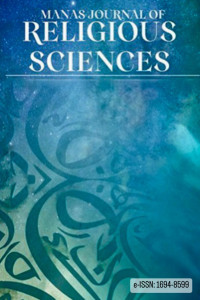The role of the family in the formation of moral values
Anahtar Kelimeler:
үй-бүлө, ата-эне, бала, тарбия, баалуулук., family, parents, children, education, values.
The role of the family in the formation of moral values
Education begins in the family. Family education is a process that directly affects the development of the society and the country and determines the future of the child. Today, the family cannot fully fulfill its historical function. Moral values in the family are a set of beliefs, principles and traditions that are passed down from generation to generation. Preparing children for life is the main purpose of the family system.The Kyrgyz have used proverbs as an empirical experience of the people in the traditional education process. For this reason, they start educating children by verbally appealing to their feelings from the first year with the words "Adep chief til/The head of morality is language". In the traditional Kyrgyz family system, raising children begins with the choice of a spouse. The fact of "knowing the seven ancestors/genealogy" plays a special role here. The background and upbringing of prospective parents affect the health, upbringing and morals of future generations. The Kyrgyz express it this way: "Whatever a child sees in kindergarten, he gets it." Parents have a special place and role in teaching moral values to children. Boys and girls were taught different moral values according to their age. Boys are brought up with the concept of "valiant", and girls with the understanding that "daughter is forbidden from forty houses". This article examines the adoption of moral values in the Kyrgyz family tradition. The study aims to guide today's parents in raising their children with a theoretical approach.
___
- Абдуллаев, Р.М., Ботобекова, Д. (2016). Адеп-ахлакка тарбиялоодо элдик педагогика каражаттарынан пайдалануу, Наука, новые технологии и инновации Кыргызстана №8. 114-116.
- Акматалиев, А. (1993). Баба салты, эне адеби: элдик салт. – Б.: Баласагын. - 115.
- Акматалиев, А. (2000). Кыргыздын көөнөрбөс дөөлөттөрү. – Б.: Шам. – 348.
- Алимбеков, А. (1996). Кыргыз этнопедагогикасы.1-бөлүк.-Бишкек.-69 б.
- Алимбеков, А. (2018). Кыргыз эл педагогикасындагы адеп тарбиясы. – Б.: «Улуу Тоолор». – 112 б.
- Жаныгулов К. (2009). Кыргыз эл акындарынын мурастарындагы балдардын жаш курак мезгилине байланыштуу таалим-тарбиялык ойлорун үзгүлтүксүз окуу процессинде колдонуу (ХIХ-ХХ к.). Канд. диссертация. Бишкек. – 150.
- Каденова, Ж. (2018) «Манас» эпосунда бала манастын инсан, патриот катары калыптанышында элдик тарбия салттарынын ролу. канд. диссертация, Ош, -170 б.
- Карасаев, Х. (2001). Хусейин наама: (Баштан өткөндөр). Б.-«Кыргызстан», -485 б.
- Карасартова Ж.Б., Имангазиева Р.У., (2015). Мугалимдердин ата-энелер менен иштөө компетенттүүлүгүн калыптандыруунун социалдык-педагогикалык шарттары, Народное образование. Педагогика. Методика преподавания. Вестник Иссык-Кульского университета, №40, https://libraryiksu.kg/public/assets/upload/vestnik/ISUKARASARTOVA2015-40(II).pdf5f8936f48d41f.pdf. 08.08.2021
- Каримова, Б.А. (2012). Үй-бүлөдө балдарды тарбиялоодо элдик педагогикага таянуу М. Р. Рыскулбеков атындагы кыргыз экономикалык ун-нин кабарлары. №3 (22).– 68-71 б.
- Шеримбекова, А. (2016). Молдо Кылыч Шамыркан уулунун чыгармаларындагы педагогикалык ойлор. канд. диссертация. Бишкек. -204 б.
- Başlangıç: 2022
- Yayıncı: Kırgızistan Türkiye Manas Üniversitesi
Sayıdaki Diğer Makaleler
Ailede Gençlerin Değer Eğitimi: Gelişim Özellikleri ve Gelişim Ödevleri Odaklı Bir Yaklaşım
Happiness as a Value in Farabi
Abdiraşit BABATAEV, Yusuf GÖKALP
Aile İçerisinde Çocuklara Yönelik Kutlamaların Kırgız Kültürünün Yaşatılmasındaki Yeri ve Önemi
Yusuf GÖKALP, Cazgül COLALİYEVA
The relationship between father and son in the example of the prophets based on the Holy Qur'an
The role of the family in the formation of moral values
İstiklal Marşı Özelinde Türk Milletini Güçlü Kılan Dinî ve Millî Değerler
